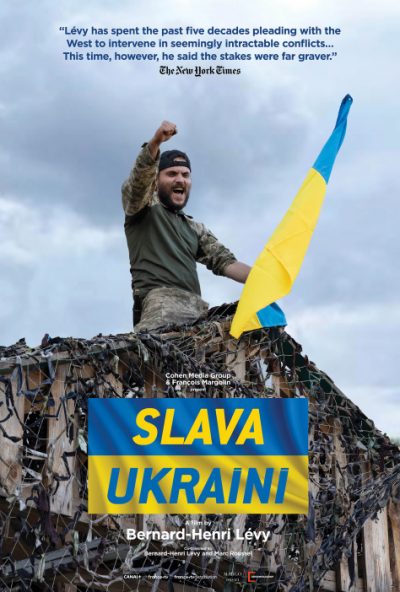
“Slava Ukraini” (“Glory to Ukraine”) (2023). Cast: Bernard-Henri Lévy. Director: Bernard-Henri Lévy. Screenplay: Bernard-Henri Lévy. Web site. Trailer.
As a sequel to a previous work, “Why Ukraine?,” which was created for European television, this latest effort seeks to dive deeper into what has been transpiring in the war-torn nation since the conflict’s onset in February 2022. Told as a sort of travelogue through the nation’s various hot spots, including many on the front lines, Lévy chronicles what has happened across Ukraine from the start of the war, oftentimes brought down to a touching, intimately personal level. We witness the pain that the country’s citizens have endured through the brutal, often-relentless Russian attacks. But we also see the utter joy and relief that many have also experienced as a result of the liberation of many areas once held by the enemies brought about by tenacious Ukrainian forces determined to maintain their sovereignty and take their nation back. Such moments frequently prove bittersweet, though, particularly when the liberated are still uncertain about the fates of loved ones who were caught up in the fighting on the way to the restoration of their freedom. There’s hope in these developments, though nevertheless tinged with sadness and doubt.
The filmmaker’s journey begins in Ukraine’s capital, Kyiv, which he contends has more or less returned to “normal,” save for the rubble of bombed-out buildings and the occasional air raid sirens, thanks to troop initiatives that have kept Russian forces at bay, often prompting hasty retreats and desertions by the invaders. From there he travels across Ukraine, visiting various large and small communities, many of which have also been reclaimed. He even ventures into the contentious Donbas region of eastern Ukraine, home to many ethnic Russians, where the area’s residents have been embroiled in conflict, often with interference from across the border, for nearly a decade. This region’s communities were among the first to fall into Russian hands when the current war began, but even many of them have now been retaken by Ukrainian forces, in many cases without much resistance.
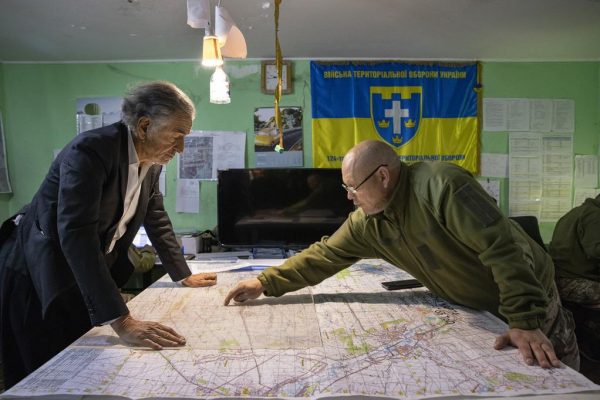
Following these travels, the film crew returned to Kyiv before heading south to the Oblast region, home to the warm water ports of Odesa and Kherson on the Black Sea, both of which came under attack by Russian forces because of their strategic nature and were still considered hot spots at the time of filming in November 2022. However, by the time of the crew’s arrival in the area, both cities were in Ukrainian hands, despite periodic bombardments of infrastructural targets by Russian missiles and the positioning of snipers across the Dnieper River, which runs through Kherson. Such measures were looked upon as scorched earth initiatives, designed more than anything else to harass and inconvenience in retreat, but they were nevertheless dangerous, as the filmmaker found out when he and his crew were hurriedly shepherded out of harm’s way when they came within the snipers’ sights.
The crew’s filmed escape from the snipers illustrates one of the key elements characterizing this picture – its content was all real, no editing, staging or alteration of any kind, a genuine, firsthand chronicle of what actually happened to Lévy and his production team while on their visit to Ukraine. The compilation of this footage thus calls to mind the work of US television crews that were present on the ground to film what happened during the Vietnam War. While this film didn’t capture as much battlefield footage as what happened in Vietnam, there are segments that illustrate the bona fide threats that the filmmaker and his staff faced while compiling their account of this all-too-real story.
Perhaps the most pertinent theme that runs through this documentary is its depiction of the unparalleled (and much publicized) sense of unity among the Ukrainian people in battling this ordeal. What’s unique here, however, is the way that this is illustrated through the film. The solidarity of Ukraine’s citizens is so pervasive that it touches virtually every element of society, with everyone working concertedly in tandem, each doing his or her part in their respective milieus to help ensure victory. They truly understand the bigger picture at play here, and they give their all to execute their various tasks to see its goals fulfilled.
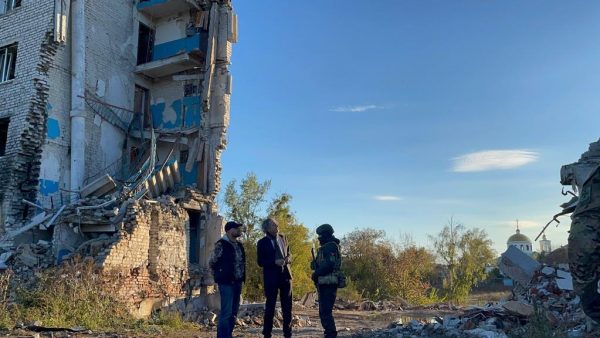
The director organically captures the stories of those involved in this effort. There are, of course, numerous accounts of soldiers and sailors diligently carrying out their missions with courage and precision. Then there are the stories of everyday citizens doing everything from collecting, assembling and distributing food and supplies to those affected by the conflict to the caregivers watching over the children to see that they’re protected and still receiving an education, even during a time of war. The roles of laborers are not overlooked, either, such as the workers at a former Soviet steel mill who are processing product necessary for carrying out the war effort. This even includes the country’s coal miners, who continue to extract this precious resource to fuel the mill’s blast furnaces. Indeed, everyone has a role to play in this immense undertaking, and the film brings them all to light.
The film also makes a point of highlighting the part that foreigners are playing in this conflict. While it’s well known that Ukraine has been receiving ample international assistance from the West in terms of weapons and supplies, the country has also been benefitting from the direct involvement of foreign nationals in country on the ground. Soldiers-for-hire from 32 nations have been participating in the war, as exemplified in an interview with a French infantryman who volunteered to fight, not only because he saw it as the right thing to do, but also because he has a personal vested interest: to help find and protect his Ukrainian wife and family, whose fate at the time of filming was unknown.
Of course, perhaps the most important foreign national in this story is the filmmaker himself, French writer-director-philosopher Bernard-Henri Lévy. His humanitarian activism in Ukraine dates back to the 2014 Maidan Revolution, when the country’s citizens clashed over the future direction of the nation – one with closer ties to the European Union or the continuation of its affiliation with Vladimir Putin and the Russian Federation. Lévy saw the handwriting on the wall if Russian influences were to be allowed to continue unabated, jeopardizing Ukrainian freedoms and its desire to align itself more with the West. And, as the tensions escalated in the time since then, he has made it one of his goals to draw attention to the situation and what it could mean, not just for Ukraine, but also for the West in general.
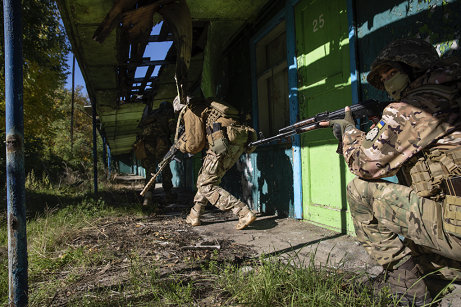
I had the pleasure of seeing this film at a special screening featuring the director in person for a Q&A session after the picture. In that session, he discussed some of his activist efforts, many of which weren’t covered in the film. For example, he noted that the proceeds from the film will be donated to charitable organizations assisting in the war effort. Moreover, Lévy added, in shooting the picture, he and his colleagues amassed roughly 200 hours of footage (which, remarkably, was pared down to an economical and well-organized runtime of 1:35:00). Amongst the unused footage he shot were the stories of many Ukrainian citizens who suffered tragic losses at the hands of the Russians, material that he is convinced could be used as visual testimony in war crimes trials when they come to pass (not if they come to pass) in what he foresees as a certain victory over the invaders, especially given the unified spirit of the nation’s citizens and the way in which the conflict has been progressing. Now that’s commitment.
In telling the stories of the Ukrainian nationals who he interviewed for the film, the director narrates these tales by drawing from his own philosophical background, presenting them with a poetic touch (which, admittedly, can get a bit flowery at times but is nevertheless quite admirable for taking a decidedly different approach to this material). He waxes expressively in speaking about what has happened to Ukraine’s citizens, none of whom asked for any of what has happened to them. Simultaneously, he draws from the history of previous international conflicts, such as the Spanish Civil War and World War II, to draw parallels between those events and what has happened in this engagement. For instance, Lévy compares Putin’s ill-timed, poorly considered invasion of Ukraine to that Adolph of Hitler’s invasion of Russia during World War II, proving once again that those who don’t learn from history are doomed to repeat it.
When all of these factors are taken together, “Slava Ukraini” paints a comprehensive, inspiring picture of a people who are willing to do whatever it takes to overcome the atrocities that have been inflicted upon them. To the Ukrainians, the question of reaffirming their sovereignty has itself never been a question to begin with, and this documentary brings that notion front and center. And Lévy doesn’t deny that this is, by its nature, a partisan film. But, in making the case for this nation and its citizens, he has put forth an important picture that anyone who truly believes in the preservation of freedom and democracy should see (and tell others about). There’s more at stake here than just one nation’s autonomy. The people of Ukraine understand that, and it’s time the rest of us did as well.
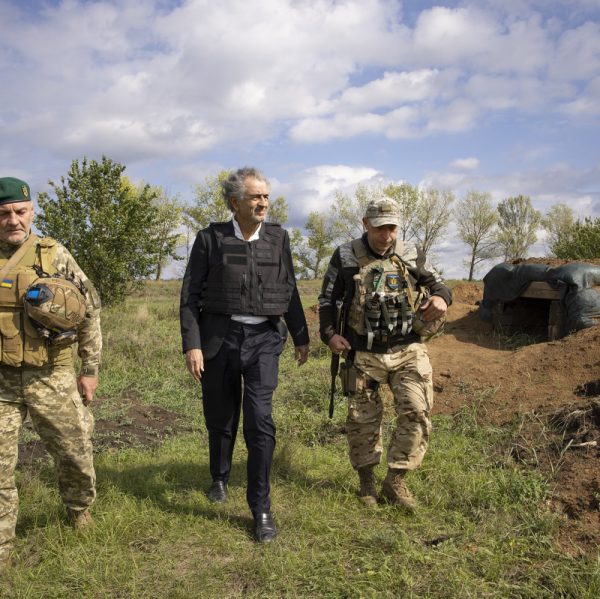
This is particularly true in light of the views held by the Russians, who have been abandoning their posts in droves. This is apparent in the huge numbers of invading troops who have simply walked away from their assigned tasks, despite whatever consequences they might face. This is also evidenced by the success of a Ukrainian program that has enabled Russian soldiers to safely defect by calling a special hotline in which the foreign troops can arrange to meet with their opponents to be escorted out of danger and retribution from their own commanders.
So why has this been happening? According to Lévy, it’s because the Russians don’t believe in the supposed cause they’ve been coerced into fighting for. They don’t see the purpose, so they can’t get behind it, and this, coupled with the focused tenacity of the Ukrainians, has led to the Russians’ demoralized attitude, sagging support and declining success on the battlefield. And who says our beliefs don’t create our reality?
The Ukrainians’ efforts have been further bolstered by beliefs in specific areas, notions designed to enhance their basic will for success. For instance, as events have unfolded, it’s become obvious that the Ukrainians have tremendous faith in their convictions, a belief that they’re certain about the justness of their cause, a powerful add-on to the convictions supporting their basic intents. Likewise, as the film illustrates, the Ukrainians have been inventive in their approach to this venture, such as the aforementioned hotline. They have successfully made use of whatever is available to them to carry on the fight, including in undertakings not directly related to combat (such as improvised infrastructural and transportation systems), even if these solutions are anything but conventional. This represents a pronounced willingness to think outside the box, to draw upon beliefs in such areas as innovation and resourcefulness that set aside any fears, doubts or limitations that might otherwise hinder their efforts. These may seem like small and simple steps in themselves, but, when combined with the Ukrainians’ other beliefs, they add up to quite a lot. Indeed, who in their right mind would want to take on an opponent with an arsenal of intent like that?
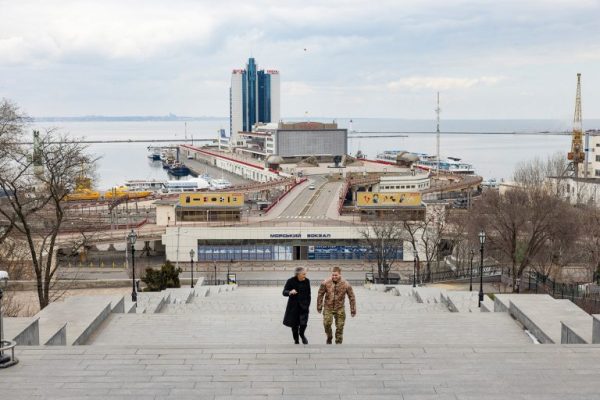
Most importantly, though, the Ukrainians have embraced a belief that victory is theirs to be had in the end. It may take some time to reach that point, and there may be more setbacks along the way. But the outcome, in their minds, has already been determined, a result that Lévy shares as well. In fact, as noted above, sharing that notion widely is one of the main reasons he made this film. Given Ukraine’s geography, situated squarely between Russia and Western Europe, the nation is seen as a transitionary bridge between these two opposing forces, and the war is as much about protecting the West against Putin’s aggression as it is about protecting the country’s sovereignty. The Ukrainians understand that, and they want their Western allies to grasp this, too. That’s why those who live outside its borders should care about – and believe in – the importance of their victory as well.
“Slava Ukraini” may not fit the standard documentary mold (especially in its eloquent voiceovers), but it nevertheless enlightens us to a far greater degree than many other films about this conflict, not to mention the subject of warfare in general. Admittedly, there is some footage that sensitive viewers might find disturbing, so those prospective audience members should take this into consideration when making a screening decision. However, in light of what this film has to offer, I’d be curious to see what else the director captured in the other 198 hours of filming that didn’t make the final cut. “Glory to Ukraine” provides valuable insight into an event that has the potential to leave a significant and long-lasting impact not just on the residents of Ukraine and its neighbors but on the totality of humanity as well. And, if a spry 70+-year-old can take up the cause to bring this story to the public’s awareness, the least we can do is watch and spread the word about it. The film is available for screening in limited theatrical release and can be found online from multiple streaming platforms.
Copyright © 2023, by Brent Marchant. All rights reserved.

No comments:
Post a Comment